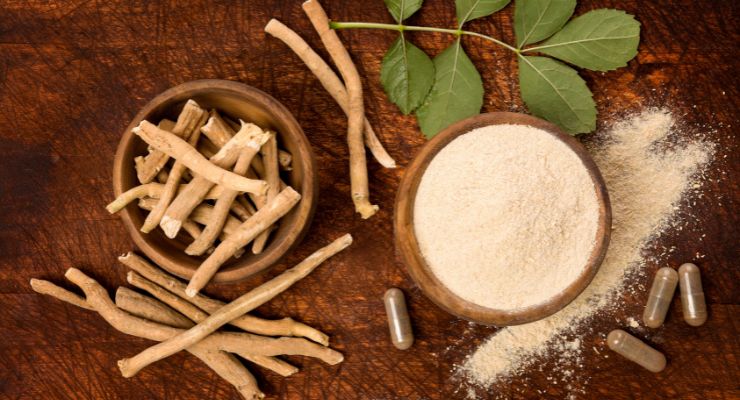01.29.24
A randomized, double-blind, placebo-controlled trial evaluating a proprietary ashwagandha extract (Witholytin) from Verdure Sciences, suggested potential anti-fatigue effects among overweight or mildly obese men and women aged 40–75 years.
Researchers evaluated the safety of this ashwagandha and its impact to perceived fatigue and stress in 111 healthy men and women, aged 40-75 years old, experiencing low energy and moderate-to-high perceived stress over a 12-week period. The study used a dosage of 200 mg ashwagandha twice a day. Witholytin is standardized to 1.5% total withanolides from the roots.
Results, published in the Journal of Psychopharmacology, indicated a significant 45.81% decrease in the total score of the Chalder Fatigue Scale (CFS) and a non-significant 38.59% reduction in stress levels, as measured by the Perceived Stress Scale, for participants taking ashwagandha compared to their baseline scores after 12 weeks.
Additional results saw an 11.41% increase (improvement) on physical score in the Patient-Reported Outcome Measurement Information System-29 (PROMIS-29), a 26.30% reduction on mental score (improvement) in PROMIS-29, and a 9.1% increase in Heart Rate Variability (HRV) compared to a 18.8% reduction in the placebo group.
Researchers concluded ashwagandha may help to support an adaptogenic approach while combating fatigue, restoring vitality, and promoting homeostasis and balance. Researchers involved in this investigation claimed that this ashwagandha demonstrated significant energy bolstering effects in overweight middle-to-older age adults who are experiencing high stress and fatigue.
A sub-analysis was conducted to investigate hormone biomarkers in both the male and female participants. Among the men who consumed ashwagandha, a significant 12.87% rise in blood concentrations of free testosterone (p = 0.048) and luteinizing hormone (p = 0.002) was observed compared to the placebo group. Considering these outcomes, it is important to further explore the demographic groups that could potentially benefit from ashwagandha supplementation, given that its stress-reducing effects may vary based on factors such as age, gender, BMI status, and other variables.
“We are excited to have this new publication join the evidence in support of Witholytin and our mounting body of evidence for ashwagandha extract standardization to USP methodology,” said Sonya Cropper, executive vice president of Verdure Sciences.
“Tremendous interest continues to build for ashwagandha, adaptogens, fatigue, energy, and mental vitality.”
Teresita Rudà, head of brands and marketing at LEHVOSS Nutrition, the exclusive distributor of Witholytin in Europe, added: “Stress and fatigue are certainly health concerns that we would like to address in the coming years in our ingredients’ portfolio and this new scientific research on Witholytin is really exciting and exactly what we have been looking forward to see.”
Researchers evaluated the safety of this ashwagandha and its impact to perceived fatigue and stress in 111 healthy men and women, aged 40-75 years old, experiencing low energy and moderate-to-high perceived stress over a 12-week period. The study used a dosage of 200 mg ashwagandha twice a day. Witholytin is standardized to 1.5% total withanolides from the roots.
Results, published in the Journal of Psychopharmacology, indicated a significant 45.81% decrease in the total score of the Chalder Fatigue Scale (CFS) and a non-significant 38.59% reduction in stress levels, as measured by the Perceived Stress Scale, for participants taking ashwagandha compared to their baseline scores after 12 weeks.
Additional results saw an 11.41% increase (improvement) on physical score in the Patient-Reported Outcome Measurement Information System-29 (PROMIS-29), a 26.30% reduction on mental score (improvement) in PROMIS-29, and a 9.1% increase in Heart Rate Variability (HRV) compared to a 18.8% reduction in the placebo group.
Researchers concluded ashwagandha may help to support an adaptogenic approach while combating fatigue, restoring vitality, and promoting homeostasis and balance. Researchers involved in this investigation claimed that this ashwagandha demonstrated significant energy bolstering effects in overweight middle-to-older age adults who are experiencing high stress and fatigue.
A sub-analysis was conducted to investigate hormone biomarkers in both the male and female participants. Among the men who consumed ashwagandha, a significant 12.87% rise in blood concentrations of free testosterone (p = 0.048) and luteinizing hormone (p = 0.002) was observed compared to the placebo group. Considering these outcomes, it is important to further explore the demographic groups that could potentially benefit from ashwagandha supplementation, given that its stress-reducing effects may vary based on factors such as age, gender, BMI status, and other variables.
“We are excited to have this new publication join the evidence in support of Witholytin and our mounting body of evidence for ashwagandha extract standardization to USP methodology,” said Sonya Cropper, executive vice president of Verdure Sciences.
“Tremendous interest continues to build for ashwagandha, adaptogens, fatigue, energy, and mental vitality.”
Teresita Rudà, head of brands and marketing at LEHVOSS Nutrition, the exclusive distributor of Witholytin in Europe, added: “Stress and fatigue are certainly health concerns that we would like to address in the coming years in our ingredients’ portfolio and this new scientific research on Witholytin is really exciting and exactly what we have been looking forward to see.”













